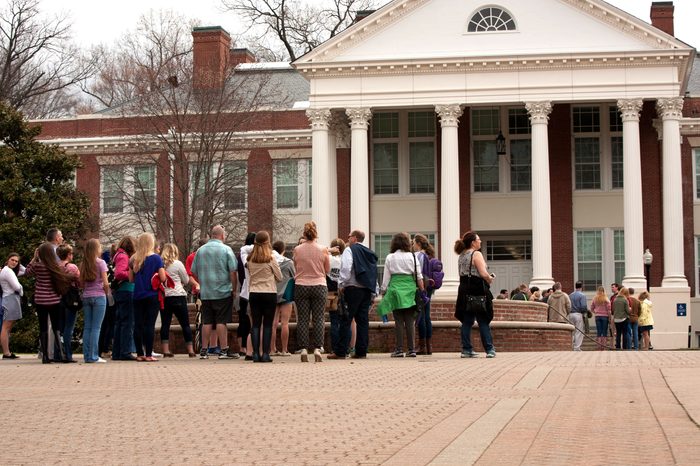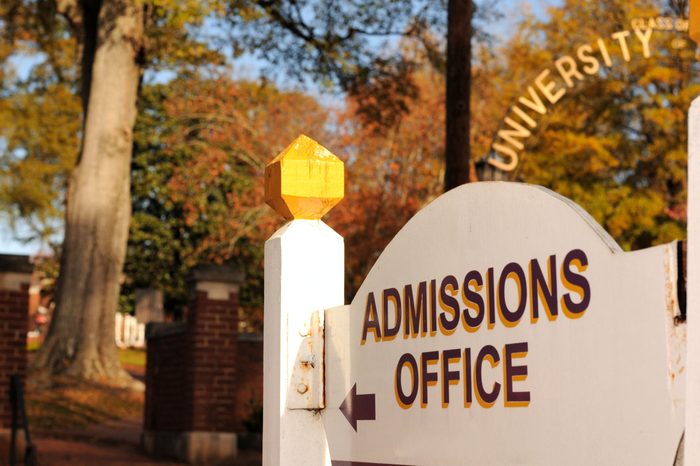
Start visiting campuses early
Visiting prospective colleges is a critical part of the college application process—whether your teen can picture herself as part of a particular college community may be just as important as what she chooses to study—so don’t try to cram all the visits into senior year. Instead, pace your visits so your teen has time to reflect on what they experience. “I think the best time to start visiting college is in the fall of junior year, and then again in the spring, and the remaining visits can take place at the end of the summer before senior year,” says Brittany Maschal, director of Brittany Maschal Consulting in New York. Once senior year begins, Maschal recommends continuing to visit schools into September and early October.

Use your vacation budget to cover visits
College tours may not be as relaxing as a chez lounge on the beach, but it’s smart to offset the expense of visiting colleges with money earmarked for vacation, according to an article in the The New York Times, basically because it’s easier to justify the cost. “Depending on how far you range from home, college visits are expensive,” cites the article. Also try building college visits into leisure trips by checking out colleges that may be close to your vacation destination. For example, if you’re visiting Cape Cod, consider visits to colleges in Boston, such as Harvard, Boston University, Tufts, Brandeis, and Northeastern. Or if you’re headed to New York City, swing by Columbia, NYU, Fordham, Hunter, and FIT, so name a few.

It may be long, but take the full tour
While it’s nice to stroll through a campus alone on a Saturday afternoon, you won’t get a complete picture of the college experience. “Take the full tour offered by Admissions, including visiting residence halls, classrooms, and labs,” says Kim Oppelt, education and outreach manager with Naviance, the student success platform used by over 9,000 schools and districts. “And if the college offers you lunch in a dining center—take it! Don’t try to cut this part of the visit short. Let students immerse themselves in the true campus experience.” (But bring road-trip snacks just in case.)

Do your homework before a visit
Before visiting a campus, find out as much as you can about that college or university. “Universities maintain extensive websites with information about majors, degree requirements, faculty, living facilities, tuition, campus diversity, scholarships, and other valuable information,” says Michael Weigold, PhD, Associate Dean for Undergraduate Affairs and Enrollment Management at the University of Florida College of Journalism and Communications in Gainesville, Florida. “You’ll ask better questions and make the most of your visit if you know the basics before you arrive.”

Schedule tours and meetings in advance
It may be tempting to show up on a campus and try to arrange meetings at the last minute. But many programs and administrators require some advance notice to arrange time for you in their schedules, says Dr. Weigold. “Two weeks before you arrive, reach out to the people you want to meet with and be flexible about setting up meetings.” If your teen has a specific major in mind, try to meet with the department chair. You might also reach out to student groups with whom you share an interest. “Visit the advising center of your chosen major or college and speak to an advisor,” Dr. Weigold adds. “Consider meeting with a professor in the department who has office hours on the day of your visit.” (While you’re there, consider scheduling a visit with a financial aid officer to learn about scholarships and other sources of help.)

Check the resources for your major
Most campuses are beautiful from the outside, but not all are equally equipped on the inside. “If you are a biology major, take time to visit the lab facilities, or if you are a media major, are there radio and TV stations you can work in on campus?” Dr. Weigold says. “Look over the library and find out about places reserved for study on campus. Locate the Career Resource Center and ask how they support career readiness.”

Get a student’s perspective
While on campus, don’t be shy about approaching students. “Happy students are proud of their school and excited to share their experiences,” Dr. Weigold says. “Think about having lunch in the student union and find students to talk to.” Use these tips to approach strangers without feeling awkward.

See what’s important to your teen
When it comes to touring schools, let your teen lead the way. Steven Roy Goodman, MS, JD, an educational consultant and admissions strategist with the firm Top Colleges in Washington, DC, suggests allowing prospective students to say where they’d like to visit and what they’d like to see on campus. “Of course, parents will also have input,” he says. “But students feel empowered when their college choices and interests are driving the process.”

Consider sending teens to tour solo
The most important part of visiting schools is the chance for teens to picture themselves on campus and how they might fit into the culture of the campus—physically, academically, and financially—for the next four years. “College is all about independence, and therefore we believe one of the best ways to plan a college visit is to join a tour group, without parents,” says Judy Marrazzo, president of goCAMPUSing, a college touring company. “We see so many of our students flourish on our tours, asking their own questions and speaking to college admissions officers about study abroad, courses offered, clubs and leadership positions on campus. And students have the opportunity to see two to three colleges per day and explore the surrounding areas—it’s a much more meaningful experience.” As a bonus, parents don’t have to take time off from work.

Get a full picture of the price
Take the opportunity while you’re there to learn what it really costs to attend the school. “Be sure to ask questions about what students typically spend on books, lab fees, and common living expenses,” advises Joseph DePaulo, Co-Founder and CEO of College Ave Student Loans in Wilmington, Delaware. Are classes and entertainment all generally in walking distance, or are there extra transportation costs to consider? What are the housing and dining options? How often do students typically eat out? “The student tour guide more than likely has general information about the school as well as valuable personal experiences to share,” he adds. They may also have advice on work-study options at their campus and what types of jobs are available. It’s also be a good time to meet with a financial aid counselor and find out the types of financial aid they offer, how you apply for it, and the key deadlines. Find out if applying under the Early Decision option impacts financial aid. “Knowing this information in advance will help students and parents as they begin to work on the college application process,” DePaulo says. Check out the money-saving habits of people who didn’t need to take out college loans.

Record a memento
If a picture says 1,000 words, think of the volumes you’ll get from a video. Molly Boegel, director of admissions programs and services at Dickinson College in Carlisle, Pennsylvania, suggests taking a few minutes at the end of your campus visit to shoot a short video interview with your teen on your smartphone. “Ask them about their impression of the campus, of the people, of their sense for how this school might be a fit for them,” Boegel says. “Recording impressions not only gives your student some good content to work with when writing college-specific essays, but also allows you to reflect back on their demeanor, their mood, and your impression of their level of comfort and general happiness while at that school.”

Connect with friends (or friends of friends) on campus
Better than any tour guide, these are the people who will be able to show you around campus in the most comprehensive way, says Lily Calcagnini, a writer with CollegeVine, whose services include one-on-one mentoring, college application guidance, college essay assistance, tutoring, and test prep. “Not only will they be able to point you towards lecture halls and the cafeteria, but also the less noteworthy buildings that would be a part of your daily routine were you to attend the school. Ask to see a dorm, the student gym, or the inside of a seminar room,” she says. Eat at the dining hall if you can—some schools provide free meals to visiting students (just ask the admissions office). And consider spending an overnight in a dorm if possible, to get a glimpse of the social life. “It can be particularly important for getting a sense of the school’s social scene and vibe outside of academics,” Maschal says.

Add sports to the equation
“If you’re a sports player, meet with a coach,” suggests Dr. Aviva Legatt, a college consultant with VivED Consulting LLC in Philadelphia and a faculty member at University of Pennsylvania in Organizational Dynamics. “For example, one of my students is a golfer, and he met with the Cornell golf coach, hoping to be a walk-on in the 2017-2018 academic year. Without that visit, my student would not have known that Cornell actually recruits only 50 percent of its golfers, while 50 percent are walk-ons. The coach spent one hour with him. While we don’t know the final admissions results yet, this personal connection certainly helped my student make a strong impression, and possibly find a home in Cornell’s golf program next year,” she says.

Visit during a typical day
Visit when classes are in session and students are on campus, suggests Mark Kantrowitz, publisher of Cappex.com, a free website about college admissions and financial aid. “The main difference between colleges is not in the faculty or the facilities, but in the students,” he says. “More of the learning occurs in informal settings working on problem sets and studying with your peers, not sitting in a classroom listening to lectures. You can get a better feel for the campus culture by hanging out with current students.”

Explore the town
College visits can be stressful, so try to make it fun, says Legatt. “Go up a day early if you can or stay a day later to see the surrounding area. Or at least find a cool restaurant or museum to visit while you’re there,” she advises. Take the time to explore what could be a “home away from home” for four years of your life.

Check out the bulletin boards in the Student Center
It may seem out-of-date in today’s social media world, but Calcagnini says this is a great way to get a sense of the pulse of the entire student body fairly quickly and without moving a muscle. “You can tell a lot about what the students care about by reading the bulletin boards. At most schools, students themselves put up posters for their organizations and events, and the turnover is pretty quick. While you’re there, take note of anything going on during your stay, and plan to check it out if possible,” she says. For example, seek out a student-run theater production, concert, art show, or sports game. “You’ll get a feel for what opportunities await you,” Calcagnini says. “Not to mention, you’ll be able to tell instantly from the attendance whether the student body at a particular college cares about what you care about too.”

Check in with the Admissions Office
If you’re serious enough about a college to visit it, make sure the admissions office knows you have been there. “This is important,” says Chris Hooker-Haring, vice president of enrollment management at Muhlenberg College in Allentown, Pennsylvania. “Many colleges track student interest, and a campus visit to do first-hand exploration is a strong indicator of serious interest.” Obviously if the Admissions Office doesn’t know you’ve been there, you don’t get that extra credit. So call or e-mail to schedule your visit through the Admissions Office, Hooker-Haring advises, and fill out the card or brief form they will ask you to complete when you arrive. “That will give them a record of you having been there,” he says.
